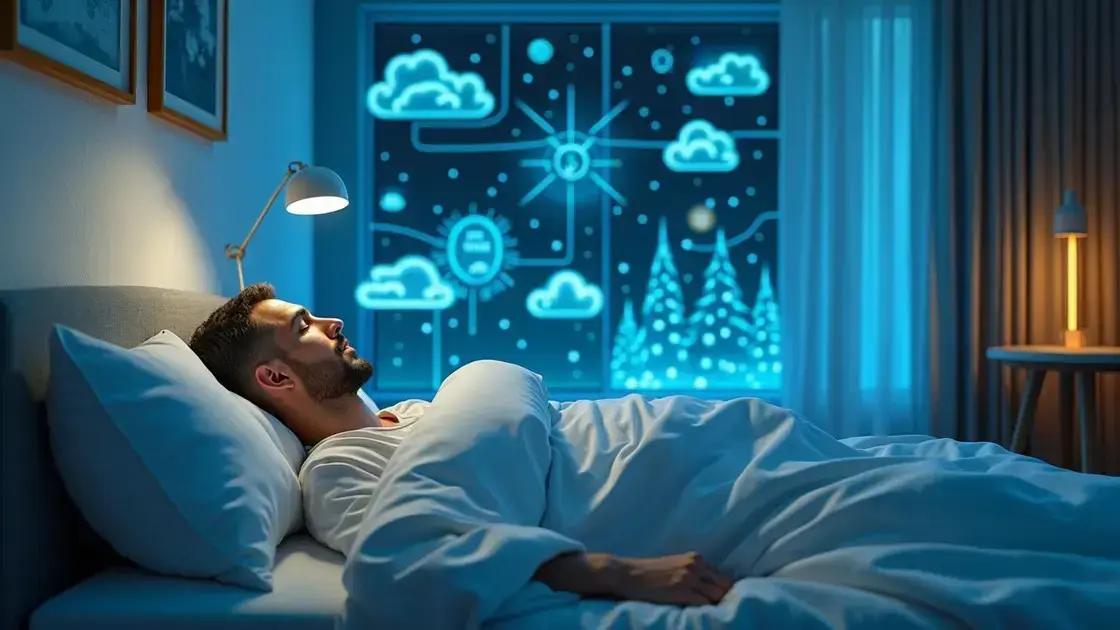AI-driven sleep optimization tools significantly benefit aging men by analyzing sleep patterns, providing personalized recommendations, and enhancing overall sleep quality through smart technology integration.
In today’s fast-paced world, quality sleep is essential, especially for aging men. AI-driven sleep optimization tools are designed to enhance sleep quality and promote better health. These innovative technologies help monitor sleep patterns, provide personalized insights, and ultimately improve well-being. In this article, we’ll dive into how these tools benefit aging men by exploring their features, advantages, and future trends in sleep technology.
Understanding AI and Sleep Optimization

Artificial Intelligence (AI) is changing how we understand and optimize sleep. With advanced algorithms, AI systems analyze sleep patterns and recommend personalized strategies to improve sleep quality. This is especially important for aging men, who may experience different sleep challenges as they age.
What is Sleep Optimization?
Sleep optimization involves using data and technology to create optimal conditions for restful sleep. This includes adjusting the sleep environment, monitoring sleep cycles, and providing actionable insights based on individual needs.
How AI Works in Sleep Optimization
AI uses various data inputs, such as movement, heart rate, and even environmental conditions, to assess sleep quality. For example, devices can track how long it takes to fall asleep and how often a person wakes up throughout the night. This data informs recommendations like optimal bedtime, environmental adjustments, and lifestyle changes.
Benefits for Aging Men
Aging men often face sleep issues like insomnia, sleep apnea, and other disruptions. AI-driven tools can offer targeted solutions by analyzing specific sleep challenges. With better sleep, aging men can experience improved mood, cognitive function, and overall health. Additionally, technology can help maintain a consistent sleep schedule, a critical factor for better sleep quality.
Benefits of AI for Aging Men’s Sleep

AI technology offers significant benefits for aging men facing sleep challenges. By harnessing the power of data, AI systems can provide custom solutions tailored to individual needs, which is especially important as sleep patterns change with age.
Improved Sleep Quality
One of the major advantages of AI in sleep optimization is the ability to enhance sleep quality. By tracking various metrics like sleep cycles, interruptions, and environmental factors, AI can suggest modifications to improve rest. This leads to deeper and more restorative sleep, which is crucial for older adults.
Personalized Sleep Recommendations
AI-driven tools analyze a person’s unique sleep patterns and provide personalized recommendations. For instance, these tools can advise on the best time to go to bed, the ideal room temperature, and even suggest relaxation techniques that promote better sleep.
Monitoring Health Indicators
Aging men often experience health issues that can affect sleep, such as anxiety, depression, or sleep apnea. AI tools can monitor vital signs like heart rate and respiration to provide insights into potential health concerns. This proactive approach allows individuals to consult with healthcare providers about their sleep and overall health.
Creating Consistency in Sleep Habits
AI tools can help establish and maintain a consistent sleep schedule. These systems remind users to wind down at a regular time and can adjust recommendations based on their sleep history. Regular sleep patterns contribute to better health and mood for aging men.
How to Choose the Right Sleep Tool

Choosing the right sleep tool involves factors that can enhance the sleep quality for aging men. It’s essential to know what features to look for when selecting an AI-driven device to ensure it meets individual needs.
Identify Your Sleep Challenges
Understanding your specific sleep issues is the first step. Whether it’s trouble falling asleep, staying asleep, or waking up too early, identifying these problems will guide your choice of tools and features. Look for devices that specialize in addressing your particular concerns.
Evaluate Device Features
Different sleep tools come with varying features. Some important features include:
- Sleep Tracking: Choose devices that accurately track your sleep patterns and provide detailed analysis.
- Environmental Adjustments: Look for tools that can help control room temperature, light, and sound.
- Relaxation Techniques: Devices offering meditation or breathing exercises can be beneficial.
Check Compatibility and Ease of Use
Ensure the device is user-friendly and compatible with your existing technology. Some tools sync with smartphones or smart home devices. A simple interface is vital, especially for elderly users, so they can easily navigate settings and understand insights.
Read Reviews and Ratings
Researching user reviews and expert ratings will provide insight into the tool’s effectiveness. Look for specific feedback from aging men to see how well the device worked for them. Reliable sources of information can help narrow down the best options.
Future Trends in Sleep Technology for Men

The future of sleep technology for men is evolving rapidly, driven by advancements in AI and increased understanding of sleep science. As researchers learn more about sleep patterns and technology improves, we can expect exciting new trends that will further enhance sleep quality for aging men.
Integration of Wearable Devices
Wearable sleep trackers are becoming more sophisticated, allowing for continuous monitoring of sleep quality and health metrics. Future devices will integrate AI to provide real-time feedback and personalized advice, making it easier for men to adjust their habits accordingly.
Smart Environment Control
Smart home technology will play a significant role in sleep optimization. Future tools will likely include advanced sensors that regulate room conditions, such as temperature, humidity, and noise levels, automatically adjusting to create the perfect sleeping environment.
Sleep Coaching Through AI
AI-driven sleep coaching is on the rise. Personalized sleep assistants will analyze data from sleep tracking and provide tailored guidance. This may include suggestions for sleep routines, relaxation techniques, and even behavioral changes to improve overall sleep health.
Focus on Mental Wellness
Future sleep technologies will increasingly address mental health. Tools that incorporate mindfulness, meditation, and stress reduction methods will help aging men calm their minds before sleep, leading to a more restful night.
In Conclusion: Embracing the Future of Sleep Technology
The integration of AI into sleep optimization tools offers remarkable benefits for aging men. From personalized sleep recommendations to smart environment controls, these technologies are transforming the way we approach sleep health.
As we look to the future, advancements in wearable devices, AI coaching, and mental wellness integration will further enhance sleep quality. By understanding how to choose the right tools and staying informed about upcoming trends, aging men can significantly improve their sleep and overall well-being.
Embracing these innovations enables better sleep and empowers aging men to lead healthier, more vibrant lives.
FAQ – Frequently Asked Questions about AI-Driven Sleep Optimization for Aging Men
What are AI-driven sleep optimization tools?
AI-driven sleep optimization tools use advanced algorithms to analyze sleep patterns and provide personalized recommendations for better sleep quality.
How can AI improve sleep quality for aging men?
AI can enhance sleep quality by tracking sleep cycles, monitoring health indicators, and offering tailored advice based on individual sleep challenges.
What features should I look for in a sleep tool?
Look for features like sleep tracking, environmental adjustments, relaxation techniques, and user-friendly interfaces to find the best sleep tool for your needs.
Are wearable sleep trackers effective?
Yes, wearable sleep trackers are effective as they continuously monitor sleep metrics and provide insights that can help improve sleep quality.
How do I establish a consistent sleep schedule?
AI tools can help establish a consistent sleep schedule by reminding you to wind down at the same time each night and suggesting optimal sleep times.
What future trends can we expect in sleep technology?
Future trends include smarter wearable devices, AI coaching, enhanced mental wellness support, and improved smart home technology for sleep optimization.













